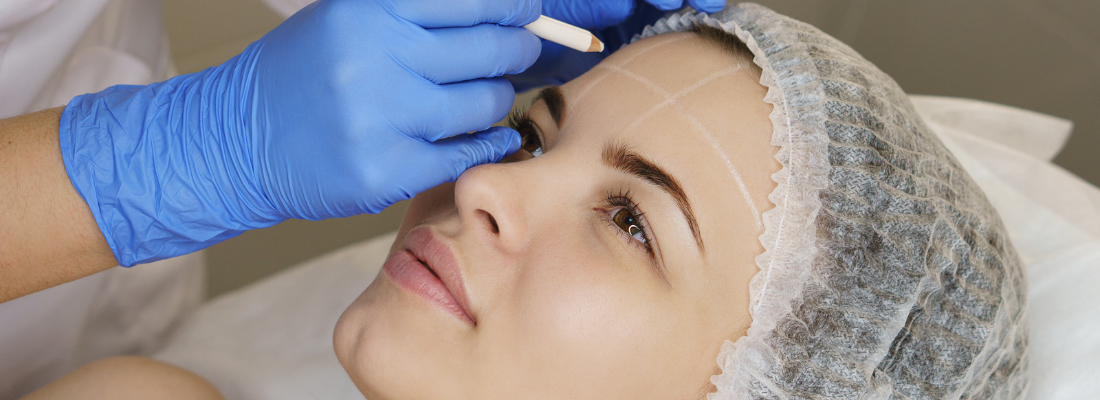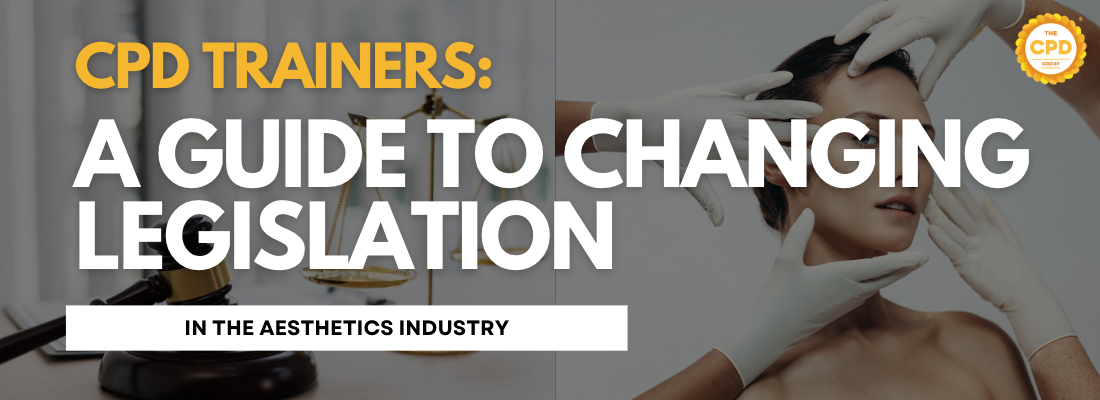What is the current legislation in the UK?
Unlike most other countries, at present anyone can practice aesthetic medicine in the UK. You don’t have to demonstrate any level of medical training or hold a particular level of qualification to administer dermal fillers, as these are not prescription drugs. Non-medic injectors who are able to work with a prescriber are also able to administer Botox treatments.

Legislation is changing in regards to aesthetics training requirements
Where is legislation heading?
The All-Party Political Group (APPG) review of non-surgical aesthetics in the UK started in 2019. Its findings were detailed in a report which was published in July 2021.
This group’s key aim was to establish the current state of the industry and to set out recommendations that would improve patient safety. These forthcoming regulations are partly the result of the APPG aesthetics inquiry recommendations; industry buzz suggests, that if adopted, they may become part of the Law in 2023. Two key features that have been raised are a licencing scheme for non-surgical cosmetic procedures and minimum educational standards for treatments with an invasive element included.

New legislation may be coming into place this year
What do The CPD Group aim to achieve?
As the go-to independent accreditation body in the UK for the Beauty & Aesthetics industry Trainers, we must offer a clear and robust accreditation service, ensuring minimum educational standards have been achieved, in line with the recommendation put forward by the APPG, appropriate and in-date insurances are held and Trainers are licenced under the soon to be mandated government Licencing Scheme. Until such time as the new guidance and Legislative changes are introduced, as the leading CPD Accreditation body in the UK, we are used to setting the standards in the industry, on this matter we have done the same by introducing a set of minimum educational standards that we will only accept to achieve our CPD Trainer Accreditation. These standards are set in this document, so for Trainers operating in the non-surgical aesthetics arena, these criteria will apply to all CPD Trainer applications. This criteria is subject to change as and when the new legislation is introduced and rolled out across the country.
The CPD Group are staying ahead of the curve when it comes to changing legislation
How we achieve this?
TCPDG have implemented a robust set of criteria for Trainer applications who aim to deliver training across a number of invasive and non-invasive treatments. To gain our CPD Trainer accreditation, every applicant must evidence their competence, experience and suitability to deliver Training in these key areas, to minimise the potential risks that are posed to people receiving these treatments, as these risks can be significant.
What do we require Trainers to provide in terms of evidence of their competence, experience, and suitability to deliver Training of invasive and non-invasive treatments?
Personal Information:
· Name
· Website Address
· Contact Number
· Personal Bio/Description
· What Types of Training are provided
· Address Details
· Local Authority Licence Scheme Number – (as and when introduced)
· Botox & Dermal Fillers ONLY – Name of current Medical Prescriber

We require a range of policies from our CPD Trainers
Policies:
· Cookies
· Data Protection
· Equality Opportunity
· Malpractice Policy
· Safeguarding
· Code of Practice
· Professional Indemnity Insurance specific to the delivery of ‘Training’
· Any further Insurances that may be mandated when the Local Authority Licence Scheme is introduced

CPD Trainers will need to meet minimum educational standard to deliver aesthetics training
Minimum Educational Standards (per procedure type – Trainers must have the appropriate technical and clinical or scientific knowledge in the subject they are teaching)
Teaching:
· Trainers are required to attain a Regulated Qualification, Professional Graduate Certificate in Education or Degree in a teaching related subject in addition to specific procedural qualifications at the levels identified in this document as a minimum to gain CPD Trainer Accreditation.
Procedural Qualification Levels:
If a Trainer applies for CPD Trainer Accreditation for a particular procedure, they will be required to hold a minimum qualification in the specific area of delivery. The tables below show the minimum requirement for a variety of procedure types:
Level 7 Qualifications (Post Graduate Level)
HRS: Hair Restoration Surgery
DFs: Permanent filler
LIPLED: Fully ablative skin treatments (i.e non fractional resurfacing)
CPSR: Full face phenol peels and injection lipolysis into superficial fat
CPSR: Medium depth chemical peels and localised phenol peels
LIPLED: Laser treatments of any sort within the periorbital rim (excluding treatments on or within the eyeball)
HRS: Hair Restoration Surgery
Level 6 Qualifications (Degree Level)
CPSR: Mesotherapy with/without homeopathic topical treatment
CPSR: Superficial chemical peels to Grenz Zone
CPSR: <1.5mm micro needling with manual device <1.0mm power assisted micro needling and >1.5mm micro needling for non-facial areas
LIPLED: Ablative fractional laser treatments (excluding treatments within periorbital rim)
LIPLED: Laser and IPL treatments for generalised and discrete pigmented lesions (excluding treatments within periorbital rim)
Level 5 Qualifications (Foundation Degree Level)
LIPLED: Laser treatments for tattoo removal (excluding treatments within periorbital rim)
LIPLED: Laser and IPL treatments for benign vascular lesions (excluding treatments within periorbital rim)
CPSR: 0.5-1.0mm micro needling with manual device
Level 4 Qualification (Foundation Degree Year 1 Level)
LIPLED: Lasers and IPL for hair removal/reduction (excluding treatments within periorbital rim)
LIPLED: Non ablative lasers IPL and LED for photorejuvination including sun induced benign dyschromia (excluding treatments within periorbital rim)
LIPLED: LED for clinically diagnosed acne vulgaris
CPSR: <0.5mm micro needling with manual device
CPSR: Very superficial chemical peels to stratum corneum
We hope that this blog post has helped you to understand the upcoming changes in legislation and how this reflects on your CPD Trainer application. If you have any further questions, please don't hesitate to contact our friendly team!



Discussion (0)
Join the conversation and share your insights with our community
Join Our Community
Share your expertise, ask questions, and engage with fellow CPD professionals
Start the Conversation
Be the first to share your thoughts on this article. Your insights could help other professionals in their CPD journey.